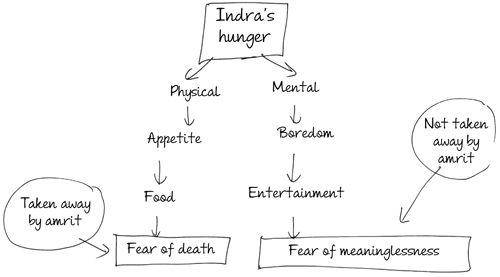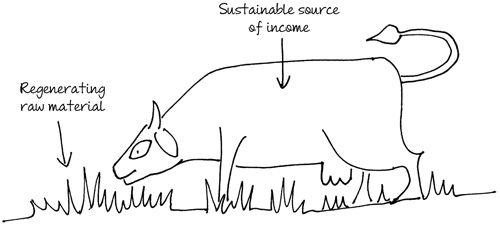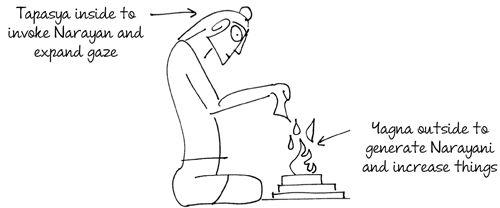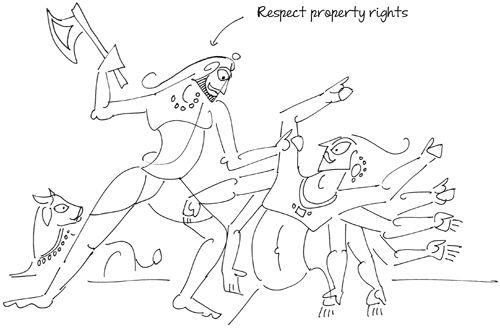Business Sutra: A Very Indian Approach to Management (23 page)
Read Business Sutra: A Very Indian Approach to Management Online
Authors: Devdutt Pattanaik

As long as the wound of Kama festers, there will be kalah, or conflict. Alakshmi, the goddess of kalah, is said to be Lakshmi's sister. There is conflict with and/or without wealth; only wisdom can rid us of kalah.

Regeneration ensures sustainable wealth
Vishnu's most popular avatar is Krishna and Krishna's abode is called Goloka, the pastureland, which is full of cows that gather around Krishna who enthralls them with the music of his flute. These cows are not tethered and do not need to be. They give their milk to Krishna joyously, continuously and voluntarily.
Cows feed on grass which when eaten grows back, making grass a renewable raw material. The story goes that a pot containing amrit was placed on the grass a long time ago, enabling it to regenerate itself. With an assured and sustainable source of food, the cow is able to give a sustained supply of milk. This makes the cow and grass symbols of sustainable and regenerating resources, which makes them sacred and an integral part of Hindu and Jain rituals.
It is very easy to see this story literally: as an appeal for a vegetarian lifestyle, or as an endorsement for protecting cows. But the message is more symbolic: it reaffirms the need to secure a sustainable livelihood. This is why the gift of the cow, go-daan, is the greatest of gifts. It makes a man autonomous; he depends on no one for food (milk) or fuel (dung).
People are advised to give so many cows that the depression left behind as a result of the dust kicked up by the gifted cows turns into a lake which sustains more life. Go-daan is an appeal to create more means of livelihood that sustain more households. Go-hatya, or killing a cow thereby destroying a man's livelihood, is the greatest of crimes.

In Vishnu temples, Vishnu's mount, the eagle Garud, is shown holding a naga, or serpent, in his talons. It is an acknowledgement of the violence inherent in feeding. But the devotee is repeatedly told that the naga is immortal. The nagas slithered over the grass on which the amrit was kept and so they, too, possess the power to regenerate themselves like grass.
Vishnu is, thus, associated with the cow and the eagle, both of which consume what is in the mythological world considered renewable food sources. Regeneration is the key to sustainability. Words like regeneration and renewal are thus intrinsic to the yagna. They compensate for the harm done by violence.
Paresh-bhai noticed his son, Raghu, negotiating a price with the tempo owner. He saw the sense of triumph Raghu felt when he managed to bring down the price by another 10 per cent. Paresh-bhai, instead of congratulating Raghu, warned him, "If he runs out of business, we will lose a very good and honest transporter for our goods. In trying to improve your margin, you are destroying his very livelihood. He is already in debt. We need our vendors to survive and thrive so that they can support our business. If we grow at the cost of our vendors, we will do well for a short time, but then collapse. They will either shut down their business or rush to aid the competition as soon as it arrives." Paresh-bhai knows the value of regenerating serpents and regenerating grass.
Restraint ensures regeneration
After harvest, for the land to restore its fertility, the farmer has to leave the land fallow. During spawning season, the fisherman must not go fishing so that he has enough fish to catch the rest of the year. Restraint is the key to regeneration and hence, also, sustainability.
Shiva is the god of restraint. He knows the secret of outgrowing hunger. Unlike Indra who only wants amrit, Shiva has the power to consume halahal, or the poison that accompanies amrit when the devas churn the ocean of milk. This is a metaphor for industrial waste that is a natural outcome of industrial activities. Indra does not care about the waste. But Shiva pays full attention to it; finding ways of containing, and even consuming, it so that the poison does not end up destroying the world. Without Shiva, the devas would not have access to amrit.
The devas, however, do not know the value Shiva brings to their lives, they remain wary of tapasvis. They prefer entertainment to introspection any day.
While the devas kill asuras, the asuras have the power to be reborn, thanks to Shiva. He gives them sanjivani vidya, the power to come back to life. The farmer may clear the forest, but sooner than later the weeds and floods come back. These weeds and floods play a key role in the regeneration of soil. Like the farmer who resents the weeds and floods, Indra resents the asuras who keep attacking Amravati at periodic intervals. He does not like Shiva helping them with sanjivani vidya. He imagines a world where every plant is a crop, existing solely for the satisfaction of his own hunger.
The asuras do tapasya to become more powerful, not wiser. They worship Shiva as a source of power, and pay scant regard to his wisdom.
Only Vishnu knows the value of Shiva. He realizes that while performing a yagna externally to generate Narayani, the yajaman has to simultaneously perform tapasya internally and invoke Narayan if he wishes to have regenerating resources and a sustainable business.

That is why the Veda keeps referring to the yagna-purush that has to be sacrificed during the yagna. While agni, the fire in the altar, burns resources externally, tapa, the fire in the mind, needs to burn the yajaman's ignorance. This needs to occur simultaneously with the ritual. Only then, can there be intellectual growth along with emotional and material growth. If the yagna does not provoke intellectual and emotional growth in the yajaman, material growth will be indiscriminate and that will herald the floods of pralay.
Pranita was always careful about money. She wanted to ensure that her children got a good education and lived a comfortable life. When she was forty, her fortunes changed. Her business started to boom. She began earning much more than her husband. "Now you can buy the jewellery that you never bought," her husband said jokingly. Pranita smiled. She never bought jewellery not because she could not afford it but because she never desired it. Why should the availability of money change that about her? Why should extra resources make her change her comfortable lifestyle? Money for her was simply a tool of comfort. She did not value people, including herself, for the money they had. This mindset allowed Pranita to use her money to invest in more businesses, both high-risk and low-return ones. Before she knew it, she had become a small investment banker partnering with an NGO, giving out micro-loans, helping women in the slums near her house, all the while maintaining a comfortable lifestyle and ensuring her children were well educated and happy. Pranita's tapasya had enabled her not to be swayed by wealth, which enabled her to perform a better yagna than others.
Restraint is violent
Rather than be encouraged to outgrow hunger through tapasya, humans typically seek to control hunger using external forces like rules and values. The path of Shiva is sidelined, as it is too mentally demanding, unpredictable, and uncontrollable. The more tangible path of Daksha and Manu is preferred.
Humans are the only living creatures with the power to contain fire in an altar, water in a pot, plants in a field, and animals in a barn. Likewise, we seek to restrain human behaviour by first defining what is acceptable behaviour and then taming the mind through force.
In nature, the strongest or most beautiful animal gets the mate. In culture, marriage laws are created to ensure everyone gets a spouse. In nature, the strongest and smartest gets the best and most food. In culture, property laws are created so that everyone, not just the strongest and smartest, can own things. The king is expected to enforce these laws; those who disobey risk punishment, exile and even death.
The Vishnu Puran tells the story of how Renuka, wife of the sage Jamadagni, is sexually attracted to the handsome king, Kartaviryarjuna, and how Kartaviryarjuna is fascinated by the magical cow, Nandini, that belongs to Jamadagni. Rules state that both wife and cow belong to the sage and everyone should respect the laws of marriage and property. Yet, neither Renuka nor Kartaviryarjuna is able to contain their respective desires. Renuka continues to dream of the handsome king while doing household chores and Kartaviryarjuna uses his military might to take Nandini by force despite Jamadagni's protests. Finally, Jamadagni orders his son Parashuram to pick up the axe, behead his mother and hack the greedy king to death.
Through rules and values, unacceptable desires and ambitions are contained and the imagination is encouraged to flow in a certain way. If the imagination resists, the axe falls. Modern society does not condone physical abuse, but considers it perfectly fine to terminate employment, or deny sustenance to a person caught cheating or stealing.
Vighnesh was very annoyed at the amount of paper work and bureaucratic demands involved every time he took a loan. His father explained, "As long as you do business with your money, the authorities do not care so much. But once you take someone else's money, you have laws and regulations, and auditors and independent directors to ensure the money is not being misused. You have to continuously reassure the regulators that you are being honest and not rash." Vighnesh found this rather amusing. He realized the assumption was that a strict teacher would compel their students to have integrity. Since when did laws make people good? Rules and punishment would only encourage the greedy to be more cunning and manipulative to get around the system. Could the rules of society stop the craving to succeed at any cost?

Seduction
No one is obliged to receive what we give. No one is obliged to participate in the exchange. Not everyone needs to be compelled into desirable behaviour; customers and employees can also be charmed. Our enchantments can be a trick, a trap, a manipulation, or an expression of genuine affection that benefits all.
Business is seduction